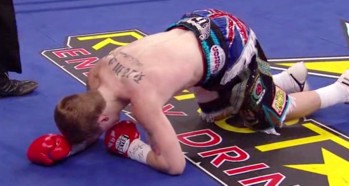 By David Monroe: People can’t change, the famous saying goes. That may be an unfair generalization, but it seems to be absolute truth for prizefighters.
By David Monroe: People can’t change, the famous saying goes. That may be an unfair generalization, but it seems to be absolute truth for prizefighters.
The Ricky Hatton that dove headfirst into Manny Pacquiao’s right hooks last night was the same free-wheeling, cautionless pugilist that succumbed to an expertly timed left at the hands of Floyd Mayweather Jr., boxing’s other transcendent talent, in December of 2007. Seconds into his second megafight, Hatton reverted to his old brawling, clenching style, despite repeated statements from his training camp that we, the boxing-viewing public, would be seeing something different from the “Hitman” in his contest against the Filipino southpaw.
But was it the old Hatton?
“There’s only one Ricky Hatton,” the famous saying goes, but not too long ago there was indeed another Ricky Hatton. In his many early wins—which included landmark victories over the likes of Jon Thaxton and Ben Tackie—Hatton looked more the classical pressure fighter than the phone-booth mauler of his later outings. This proto-Hatton bounced in and out of a scrap, utilized the jab and head-movement on the way in, and once inside, punched from inventive angles and rarely tied his opponent up for more than a few moments. That fighter, perhaps, stood a chance against Manny Pacquiao.
Unfortunately for Ricky and his legions of fans, it was indeed the “new” Ricky Hatton that stepped into the ring on Saturday night.
Whence came this new Hatton, the Hatton most fans know, the fighter whose style many critics decry as a debased form of wrestling?
The source of Ricky’s development into a rugged clench artist may have been his greatest triumph: his sensational 2005 victory over the great Kostya Tszyu. To overcome the pedigreed puncher Tszyu, Ricky engaged him in a gritty and perhaps unsightly journey of clench warfare. Tszyu quit after the end of the 11th round. It was Ricky’s shining moment, granting him the IBF light-welterweight title as well as a unique brand of superstardom that the world won’t soon forget.
After the fight against Tszyu, Ricky faced the highest caliber of opponents, fearsome pugilists with well-known names like Juan Urango, Luis Collazo and Jose Luis Castillo. Here the Hitman relied on the style we know so intimately, tying up his man and throwing well-placed pot shots at close range. What he did, he did with style and enthusiasm. He made ugly into an art.
In 2007, his star bright in the sky, Ricky’s fairy tale culminated in an unfortunate challenge of then pound-per-pound king Floyd Mayweather Jr. The much-criticized and much-adored mauler-brawler of the previous three years walked right into a Mayweather left hook, a blow as dramatic and decisive as the punch it most vividly recalled: the left hook Ray Robinson used to put away Gene Fullmer over half a century earlier.
Despite the claims of him and his new trainer—the father of the man who handed him his first brutal defeat—and despite a convincing November TKO of Paulie Malignaggi in which he looked like his new (old) self, Ricky exhibited all of his old (new) flaws against Manny Pacquiao.
It can be argued that Hatton had to reinterpret the Marquis of Queensbury Rules in order to hang with the big boys, and that neither the old nor the new Ricky Hatton could ever compete favorably with the very best.
Despite the criticisms, credit must be given to Hatton for twice crossing an ocean as an underdog to face boxing’s best. In addition, his following was truly something to behold. Ricky lured tens of thousands of admirers across the Atlantic to Vegas on multiple occasions. But courage and charisma are not enough to win a fight, even though many of us may wish that were the case.
It’s time to “hang ‘em up,” as the famous saying goes. Leaving the sport after a night like May 2nd would be difficult, but for the sake of Ricky and his family I hope he strongly considers it. Failing twice on the sport’s highest stage is not failure in the traditional sense of the word. Ricky can still hold his head high, sure in the knowledge that his many critics lack both the skills and the courage that brought him this far. He should return to his beautiful son and fiancée and try to appreciate the many fine things that life has to offer besides fisticuffs.
But what’s really next for Ricky Hatton? He could very well fight on against a lesser opponent in front of a packed stadium in the UK, and possibly go out with one of those coveted W’s. That would be anti-climactic. It would also be dishonest, given that Ricky’s ambition has always pointed him toward the highest throne the game has to offer.
Ricky would doubtlessly make a great promoter, perhaps in the vein of Oscar De La Hoya, boxing’s other charismatic superstar. But after so long in the ring, is Ricky Hatton cut out for anything else besides pugilism? Can you teach an old dog new tricks?
Well, it might take a third Ricky Hatton.